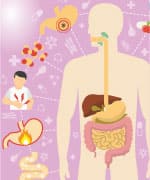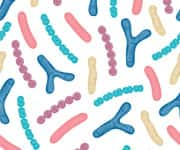Life Extension Magazine®
Digestion is a complicated process.
Enzymes are needed to break down each of the major food groups: carbohydrates, proteins, and fats.
The recent trend toward eating more plant-based foods has brought along with it the need for additional enzymes to break down hard-to-digest, fiber-rich foods.
As we age, internal production of digestive enzymes declines.1 As a result, undigested foods may pass into the large intestine,2,3 causing bloating, gas, diarrhea, and cramping.
Researchers have identified additional enzymes that specifically promote digestion of high-fiber plant foods.
When combined with a specific probiotic, these benefits can be further enhanced.
Common Causes of Digestive Problems
Many health problems plaguing aging adults, including digestive discomfort like gas and diarrhea, impaired immunity, and nutritional deficiencies, can often be attributed to poor digestion.
Two important causes of digestive problems are:1-5
1. Age-related declines in production of endogenous digestive enzymes, and
2. Imbalances in the gut microbiota.
Digestive enzymes are needed to break down the foods we eat and extract essential nutrients from them. And a proper balance of bacteria must be present in the gut to prevent bloating, gas, and other unpleasant digestive symptoms.
Drugs such as Alka-Seltzer® and Pepto-Bismol® can temporarily relieve some symptoms but do nothing to address the underlying problem.

WHAT YOU NEED TO KNOW
Boost Digestion
-
Poor digestion can result in bloating, gas, and discomfort, and compromises the absorption of key nutrients.
-
Digestive problems can be caused by an age-related decline in digestive enzymes and an imbalance in the all-important gut microbial ecosystem.
-
Increasing your intake of plant-based foods creates special challenges to your digestion but special enzymes that specifically target these high-fiber foods can help your body better handle a plant-based diet.
-
Digestive enzymes can help break down and digest food while preventing gastrointestinal distress and promoting better overall health.
-
Adding Bacillus coagulans to a broad range of digestive enzymes may provide protection against several gastrointestinal discomforts.
The Power of Digestive Enzymes

To help break down food more completely by the time it reaches the end of our small intestine, substantial amounts of all required digestive enzymes are needed.
This helps prevent undigested food from passing into the colon and causing gastrointestinal problems.
About 70 years ago, scientists first discovered6 that taking digestive enzymes orally leads to more complete digestion of foods in the stomach. Since then, studies have validated the beneficial effects of digestive enzyme supplementation.7-9
Optimal digestion of major food types, including proteins, fats, dairy, and plant cellulose (fiber), requires different digestive enzymes, such as:
- Protease,
- Lipase,
- Lactase,
- Cellulase, and
- Bromelain.
The Challenge of Plant-Based Diets

In recent years, diets have changed. More people are reducing their meat and other animal-derived food intake and increasing their intake of plant-based foods.
The cell walls of these foods contain complex polysaccharides and fibers. While fiber is an important part of a healthy diet, it may also bind to minerals and other nutrients, blocking their bioavailability and preventing their absorption.
Humans do not produce the enzymes required to break down fiber and depend on enzymes produced by intestinal microorganisms.10,11
Protease 3.0 is an enhanced form of the protease enzyme that helps digest gliadin found in wheat.
To properly break down other plant-based foods requires:
- Alpha-galactosidase,
- Hemicellulase,
- Cellulase,
- Xylanase, and
- Pectinase.
General Purpose Enzymes

The enzymes described next have long been used to improve digestion. Each has a specific, targeted function that helps break down complex foods into nutrient components that can be readily absorbed.
Protease
Protease breaks down proteins. Research shows that giving protease to animals enhances their digestion.12
Aging individuals may receive tremendous potential benefits from supplementing with protease enzymes in order to increase the efficiency of protein digestion.
Lactase
Lactase breaks down lactose, or milk sugar. Older people are often deficient in this enzyme,13 resulting in cramps, bloating, gas, and diarrhea after consuming dairy products.14 But avoiding dairy can cause calcium deficiency, increasing the risk of osteoporosis and bone fractures.15-18
Studies show that taking lactase reduces or eliminates post-meal abdominal cramping, belching, flatulence, bloating, and diarrhea in people with lactase insufficiency. It also promotes better overall nutrition.19
Lipase
Lipase breaks down fat into individual fatty acids and related substances. It helps the body absorb vital fat-soluble nutrients, such as omega-3 fatty acids, carotenoids like lycopene and lutein, and vitamins A, D, K, and E.20
Without sufficient lipase, incompletely digested fats can cause greasy, fatty stools and cramping. Inadequate fat digestion also blocks absorption of key vitamins, leading to deficiencies.
Taking oral lipase promotes fat digestion.21,22 In one study, pancreatic lipase enzymes were given to subjects eating a high-fat meal, resulting in significant reductions in bloating and gas.22
Bromelain
Bromelain is extracted from pineapple stem and fruit. It helps with digestion of proteins.23,25
Scientists studied adults with an inability to fully digest and absorb fats and proteins. Taking an enzyme mix containing bromelain improved digestion and absorption of both these food groups.25
Digestive Enzymes to Support Plant-Based Diets

The enzymes described so far support basic digestion. But the trend toward plant-based foods means additional enzymes can help improve the breakdown of hard-to-digest types of plant fibers.
The following digestive enzymes deliver potent support for high-fiber, plant-based diets.
Protease 3.0
Traditional protease breaks down most proteins. But a specialized protease known as protease 3.0 is even better at promoting the digestion of proteins in acidic conditions such as those found in the stomach.
This enzyme may also help some people with gluten sensitivity or intolerance since it specifically promotes digestion of gliadin, a protein found in gluten in wheat, and some other grains.
Alpha-Galactosidase
Alpha-galactosidase is a digestive enzyme that breaks down oligosaccharides, carbohydrates found in plant foods including beans and cruciferous vegetables (such as cauliflower, broccoli, and cabbage).
Taking this enzyme substantially reduces bloating, discomfort, and flatulence associated with eating these foods.26,27
In one study, scientists recruited volunteers with irritable bowel syndrome (IBS). For three days they ate a diet high in a type of oligosaccharide that triggers IBS symptoms. The group that took oral alpha-galactosidase had a clinically significant reduction in gastrointestinal symptoms compared to a placebo group.28
Cellulase
Cellulase is not produced naturally in the human body. It allows humans to digest most cellulose, or plant fiber.
This allows for smoother digestion of tough vegetable fiber and minimizes the excessive flatulence that deters many people from eating healthy, high-fiber foods like broccoli and beans.
Hemicellulase, Xylanase, and Pectinase
Additional digestive support is found in three enzymes specific for the breakdown of plant foods high in fiber:
-
Hemicellulase breaks down hemicellulose, a complex carbohydrate that is a major component of cell walls in plants.
-
Xylanase breaks down xylan, another complex sugar found in plant cell walls. When undigested, xylan can impair nutrient absorption.29
-
Pectinase breaks down pectin, a naturally occurring substance found in pears, apples, guavas, plums, oranges, and other fruits.
An optimal selection of enzymes should include:
-
The full range of traditional digestive enzymes, and additional enzymes that target high-fiber and gas-producing plant foods.
A Probiotic for Digestive Health

Even greater digestive health is possible with the addition of a targeted probiotic.
Probiotics are microorganisms that, taken in adequate amounts, have a health benefit. Like enzymes, they are vital to the digestion process.
One particular probiotic, Bacillus coagulans strain MTCC 5856, has been shown to effectively treat both constipation and diarrhea, along with other symptoms of irritable bowel syndrome.30,31
In a double-blind, placebo-controlled study, patients with irritable bowel syndrome took tablets containing 2 billion spores of Bacillus coagulans strain MTCC 5856 daily. This led to a significant decrease in bloating, vomiting, diarrhea, abdominal pain and discomfort, and stool frequency.31
Addition of this probiotic strain to a broad range of digestive enzymes may provide comprehensive protection against several types of gastrointestinal discomfort.
Summary

As we age, the levels of digestive enzymes in our bodies decline. This triggers digestive problems, including bloating, gas, and diarrhea, and prevents absorption of nutrients.
The recent shift toward eating more plant-based foods can increase this problem, because the increased amount of difficult-to-digest plant fiber components requires specialized enzymes.
Digestive enzymes can boost the body’s ability to fully break down food and may prevent gastrointestinal distress and promote better overall health.
Addition of the probiotic Bacillus coagulans to a broad range of digestive enzymes may provide a high level of protection against several gastrointestinal discomforts.
If you have any questions on the scientific content of this article, please call a Life Extension® Wellness Specialist at 1-866-864-3027.
References
- Remond D, Shahar DR, Gille D, et al. Understanding the gastrointestinal tract of the elderly to develop dietary solutions that prevent malnutrition. Oncotarget. 2015 Jun 10;6(16):13858-98.
- Di Stefano M, Veneto G, Malservisi S, et al. Lactose malabsorption and intolerance in the elderly. Scand J Gastroenterol. 2001 Dec;36(12):1274-8.
- Laugier R, Bernard JP, Berthezene P, et al. Changes in pancreatic exocrine secretion with age: pancreatic exocrine secretion does decrease in the elderly. Digestion. 1991;50(3-4):202-11.
- Bures J, Cyrany J, Kohoutova D, et al. Small intestinal bacterial overgrowth syndrome. World J Gastroenterol. 2010 Jun 28;16(24):2978-90.
- Lin HC. Small intestinal bacterial overgrowth: a framework for understanding irritable bowel syndrome. JAMA. 2004 Aug 18;292(7):852-8.
- Howell E, National Enzyme Company C. The status of food enzymes in digestion and metabolism. Chicago, Ill.: National Enzyme Co.; 1946.
- Roxas M. The role of enzyme supplementation in digestive disorders. Altern Med Rev. 2008 Dec;13(4):307-14.
- Glade MJ, Kendra D, Kaminski MV, Jr. Improvement in protein utilization in nursing-home patients on tube feeding supplemented with an enzyme product derived from Aspergillus niger and bromelain. Nutrition. 2001 Apr;17(4):348-50.
- Karani S, Kataria MS, Barber AE. A double-blind clinical trial with a digestive enzyme product. Br J Clin Pract. 1971 Aug;25(8):375-7.
- Supplier Educational Articles. Enzymes 101. Data on File. 2020.
- Supplier Educational Articles. Probiotics 101. Data on File. 2020.
- Eun JS, Beauchemin KA. Effects of a proteolytic feed enzyme on intake, digestion, ruminal fermentation, and milk production. J Dairy Sci. 2005 Jun;88(6):2140-53.
- Lee MF, Krasinski SD. Human adult-onset lactase decline: an update. Nutr Rev. 1998 Jan;56(1 Pt 1):1-8.
- Available at: https://www.medicinenet.com/script/main/art.asp?articlekey=6201. Accessed January 9, 2019.
- Newcomer AD, Hodgson SF, McGill DB, et al. Lactase deficiency: prevalence in osteoporosis. Ann Intern Med. 1978 Aug;89(2):218-20.
- Birge SJ, Jr., Keutmann HT, Cuatrecasas P, et al. Osteoporosis, intestinal lactase deficiency and low dietary calcium intake. N Engl J Med. 1967 Feb 23;276(8):445-8.
- Di Stefano M, Veneto G, Malservisi S, et al. Lactose malabsorption and intolerance and peak bone mass. Gastroenterology. 2002 Jun;122(7):1793-9.
- Hodges JK, Cao S, Cladis DP, et al. Lactose Intolerance and Bone Health: The Challenge of Ensuring Adequate Calcium Intake. Nutrients. 2019 Mar 28;11(4):718.
- Sanders SW, Tolman KG, Reitberg DP. Effect of a single dose of lactase on symptoms and expired hydrogen after lactose challenge in lactose-intolerant subjects. Clin Pharm. 1992 Jun;11(6):533-8.
- Layer P, Keller J. Lipase supplementation therapy: standards, alternatives, and perspectives. Pancreas. 2003 Jan;26(1):1-7.
- Dominguez-Munoz JE, Iglesias-Garcia J, Iglesias-Rey M, et al. Effect of the administration schedule on the therapeutic efficacy of oral pancreatic enzyme supplements in patients with exocrine pancreatic insufficiency: a randomized, three-way crossover study. Aliment Pharmacol Ther. 2005 Apr 15;21(8):993-1000.
- Suarez F, Levitt MD, Adshead J, et al. Pancreatic supplements reduce symptomatic response of healthy subjects to a high fat meal. Dig Dis Sci. 1999 Jul;44(7):1317-21.
- Pavan R, Jain S, Shraddha, et al. Properties and therapeutic application of bromelain: a review. Biotechnol Res Int. 2012;2012:976203.
- Available at: https://nccih.nih.gov/health/bromelain. Accessed January 9, 2019.
- Knill-Jones RP, Pearce H, Batten J, et al. Comparative trial of Nutrizym in chronic pancreatic insufficiency. Br Med J. 1970 Oct 3;4(5726):21-4.
- Di Stefano M, Miceli E, Gotti S, et al. The effect of oral alpha-galactosidase on intestinal gas production and gas-related symptoms. Dig Dis Sci. 2007 Jan;52(1):78-83.
- Zhang S, Song J, Deng Z, et al. Effects of combined alpha-galactosidase and xylanase supplementation on nutrient digestibility and growth performance in growing pigs. Arch Anim Nutr. 2017 Dec;71(6):441-54.
- Tuck CJ, Taylor KM, Gibson PR, et al. Increasing Symptoms in Irritable Bowel Symptoms With Ingestion of Galacto-Oligosaccharides Are Mitigated by alpha-Galactosidase Treatment. Am J Gastroenterol. 2018 Jan;113(1):124-34.
- Polizeli ML, Rizzatti AC, Monti R, et al. Xylanases from fungi: properties and industrial applications. Appl Microbiol Biotechnol. 2005 Jun;67(5):577-91.
- Lactobacillus sporogenes. Altern Med Rev. 2002 Aug;7(4):340-2.
- Majeed M, Nagabhushanam K, Natarajan S, et al. Bacillus coagulans MTCC 5856 supplementation in the management of diarrhea predominant Irritable Bowel Syndrome: a double blind randomized placebo controlled pilot clinical study. Nutr J. 2016 Feb 27;15:21.

